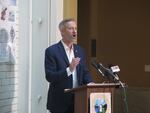About half of the people Portland Police arrested in 2017 and 2018 were people experiencing homelessness.
The city of Portland is developing a program to combat that criminalization.
The program is called Portland Street Response. It’s looking to take police off of low-priority 911 calls and instead send a new branch of first responders, trained in behavioral health, to address issues related to people experiencing homelessness or mental health crises.
“Historically it’s been up to the police to shoulder most of the responsibility as first responders in crisis calls, but in many cases, police are not the right resources to respond,” Portland Mayor Ted Wheeler said at a press conference Thursday. “They are the final safety net when all other safety nets have failed.”

Portland mayor Ted Wheeler speaks about Portland Street Response Nov. 14, 2019, at Portland City Hall.
Meerah Powell/OPB
This past May, Portland City Council approved $500,000 toward Portland Street Response. Now the city is working on a pilot set to launch next spring.
“Today we start down the path of ensuring that we have the right first responder at the right time for the right incident,” commissioner Jo Ann Hardesty said.
Hardesty and Wheeler convened a 40-person work group in May made up of people experiencing homelessness, business-owners, neighborhood associations and service providers. City Council will discuss the work group’s recommendations for the program at a Nov. 21 meeting.
Related: Multnomah County Readies Homeless Services For Winter Weather
“The Portland Street Response is, in my opinion, one of those rare proposed programs that has broad support from police, the business community, from homeless advocates, from nonprofit leaders and many, many others,” Wheeler said.
At Thursday’s press conference, along with city leaders, community and business leaders gathered to express support for the program.
Darren Golden, with the Urban League of Portland, said Portland Street Response could help the relationship between communities of color and the police.
“It’s no secret that the black communities in Portland have deep-seated, well-earned mistrust with the Portland police and that is magnified for our black houseless neighbors,” Golden said. “It is time for Portland, being the progressive city that it is, to stop taking active steps to criminalize poverty and instead adopt a public health approach to begin repairing our community.”
Hardesty said the city, with help from Portland State University, will monitor the pilot program’s effects when it begins in the spring.
“We must do better and Portland Street Response is our opportunity to do just that,” Hardesty said.
The Eugene and Springfield area has a similar street response program, called CAHOOTS (Crisis Assistance Helping Out On The Streets) that serves as a 24/7 mobile crisis team. The program has been a model for other cities since it started in 1989.
